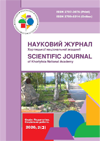UDC: 376-056.2 THE SPECIFICS OF TRAINING FUTURE EDUCATORS FOR WORK IN AN INCLUSIVE EDUCATIONAL ENVIRONMENT
DOI: https://doi.org/10.51706/2707-3076-2020-3-12
Abstract
The article analyzes the specifics of training future educators for work in an inclusive educational
environment; the concept of inclusive educational environment is revealed; the emphasis is placed on the role
of preschool institutions in the continuum (lifelong learning). Emphasis is placed on the following conditions of
future professional readiness to work in an inclusive educational environment, namely the recognition of the
values of inclusive education as guidelines for professional activity (equality, rights, participation, community,
respect for diversity, sustainable development, nonviolence, trust, compassion, honesty, courage, joy, love,
hope and beauty); the relationship of educational material of different disciplines of the professional and
pedagogical cycle; inclusion of students in effective professional cooperation (pedagogical practice, coteaching, mentoring, dialogue), improvement of professional competence of the future specialists (cognitivemotivational, reflective, communicative, multicultural, etc.).
Speaking about the preparation of future educators to work in modern preschool education, it should
be emphasized on the formation of students' ability to solve problems by applying the knowledge gained
during the study of disciplines of the psychological and pedagogical cycle, and, accordingly, to create both in
the classroom and outside it the educational environment focused on the features of future professional
activity, to use their own experience during pedagogical practice, in accordance with the age characteristics of
children and the specifics of the stage of their learning.
The environment for the child development should be modern and contribute to the effective formation
of children's competencies, skills of independent and joint activities, active interaction in society needed for
realization of their own potential. Subject-spatial environment should be content-rich, ready for transformation;
multifunctional; variable; available; safe.
We support the view of many scholars that the worldview of educators should change, and that
philosophy and principles of inclusion should become an integral part of professional thinking. We understand
that it is important to analyze the experience of other countries, which has its advantages and challenges, and
implement the best examples of pedagogical practice of providing support to children with special educational
needs in educational process in Ukraine


